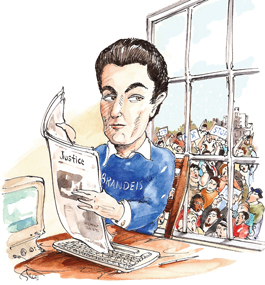Turning Points
Reality Check
NPR's Guy Raz '96 knows more than his father about journalism practice and standards. Sort of.

Mark Steele
by Guy Raz '96
I can’t remember if it was a Sunday or a Monday, but, on one of those nights, The Justice, the weekly student newspaper at Brandeis, “went to bed.” A courier would pick up the finished boards, drive them out to the printer in western Massachusetts and deliver the completed newspapers the following day around campus. But the night the paper went to bed was sacred. At the end of the night, all of us who worked on it would collapse exhausted in our rooms.
I had started working at the Justice within days of my arrival as a first-year student. My passion was newspapers. I ran mine in high school and it was my hope to do the same at Brandeis. I knew when I finished college I’d try to become a newspaperman.
Outside of class, I spent all my waking hours inside that grimy, windowless office deep under the Usdan Student Center. I ate my meals there, left my rotting ones there, did my reading there, learned that a news story must be written as an inverted pyramid, and mastered the art of double-sourcing a fact. It was a thrilling place to be, full of camaraderie and energy.
A few weeks into my sophomore year, I became the opinion page editor. It was something like leaving the enlisted ranks and joining the officers. Plus, I got a key to the office.
Late in the first semester, on the day the paper would be put to bed, the usual editorial board meeting was held. At that meeting, two senior editors announced that the paper would be running a controversial advertisement that week. The ad — written by a known Holocaust-denier — called into question the existence of the gas chambers. There were a few murmurs and even perhaps a protest or two among the dozen editors gathered. But one of the senior editors made a persuasive argument that seemed reasonable and rooted in principle. So most of us shrugged our shoulders and moved on.
A few hours later, I was on the phone with my father. I mentioned the paper would be making a principled, First Amendment statement.
My father was apoplectic.
“Are you guys crazy?”
“Oh, Dad,” I replied. “What do you know about newspapers? You run a small business. We are morally obligated to protect this odious man in order to protect you and me as well.”
My dad conceded he wasn’t a newspaperman. And he didn’t quite understand all the hard moral choices First Amendment advocates often made. But he did have a quality that trumped all of these things. My dad had common sense rooted in basic life experience. He understood viscerally that to have made that decision hastily was wrong. (I failed to inform my dad that the paper had a policy against running tobacco or pornography ads.) He also argued that it was a bad decision.
“Go back and ask your fellow editors to reconsider. Promise me that.”
So I did.
I called the other editors and asked them to return to the office for an emergency meeting. For three hours we listened as each person made the case for or against.
I thought about what my dad said and began to suspect we were making a mistake.
And so, on the final vote, I was among the small minority of editors who opposed running the ad. But I was unable to persuade my colleagues. The ad would appear in the newspaper the next day.
The community response was overwhelmingly hostile. The papers were stolen, a mass rally was held condemning the Justice, angry donors and alumni demanded an explanation, and the national news media descended upon the campus to tell the dramatic story of how it all happened at a Jewish-founded institution.
For me, it was not a happy ending. Too much anger and hostility had been traded at that editorial meeting and in the days after. A few weeks later, I left the newspaper. My whole identity as a newspaperman vanished overnight and I lost many friends.
I needed to leave Brandeis, so the following September I went to study abroad in London for the year.
I never became a newspaperman. But I remained a journalist after I graduated.
I still talk to my dad two or three times a week. He always asks what I’m working on. I always listen to his take. And I always sound him out.
He’s not a professional journalist. Thank God for that. He’s a reality check.
Guy Raz ’96 is the weekend host of NPR’s flagship newsmagazine, All Things Considered.